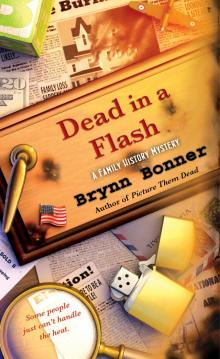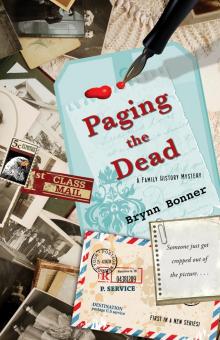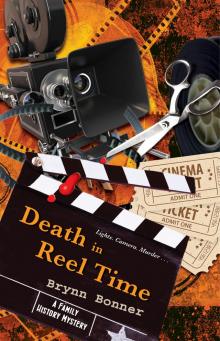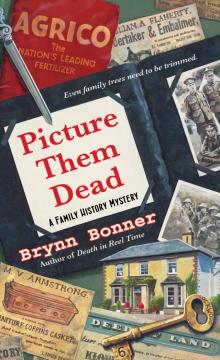- Home
- Brynn Bonner
Paging the Dead Page 17
Paging the Dead Read online
Page 17
I made a stab at explaining consanguinity links, but Cassidy’s frown only deepened. I reached for an example. “It would be like if you’d known Gigi’s mother,” I said. “She would be your great-grandmother.”
“No, that would be Auntie Dot,” Cassidy said. “And she’s dead now.”
“Aunt Dot was Gigi’s sister, not her mother,” Jeremy said.
“No,” Cassidy insisted, her mouth setting in a stubborn line. “Gigi told me, Auntie Dot was her only mother.”
Jeremy started to correct her, but I pre-empted him. “You’re right, Cassidy. She’s told us that, too. Let’s just say this woman is someone from your family who lived a long time ago. She’s related to all of you.”
Cassidy studied the picture. “Gigi looks sad like that sometimes,” she said. “Why didn’t this lady smile for her picture? You’re supposed to smile nice.”
“Back in those days a person had to sit still for a long time to have a picture taken. I mean really still, like they were frozen. It was hard to hold a smile that long so most people have serious expressions in their pictures.”
Cassidy considered this for a moment. “I’m going to see how long I can smile,” she said, pulling her mouth back until her whole face contorted. She held it as she took her bag and went to the futon.
“Thanks,” Jeremy said. “I’m a fact guy. I forget sometimes there’s different ways to interpret things. I guess Mom did think of Dorothy as a mother figure.” He was silent for a few minutes, seemingly lost in thought. Finally he said, “I admit it, I was unfair to Dorothy in some ways. In my defense, she didn’t make things easy. She was a hard woman to deal with, but Mom’s told me a lot over the last week and now I realize I blamed Dorothy for things she had no hand in. And at the end of the day she did try to make it up to my mother.” He glanced over to make sure Cassidy wasn’t listening. “This will be all over town soon enough, so you might as well know. Dorothy left High Ground to the town of Morningside.”
“Oh,” I said, wondering how this made anything up to his mother. “And you’re pleased about that?” I asked tentatively.
“Yes,” he said, “I mean, who’d want to live in that old mausoleum? And the upkeep would make it unsustainable as a private home. The town can make good use of it. But she left my mother the house they grew up in and the gatehouse at High Ground.”
“Oh, that gatehouse is beautiful,” I said. “Esme and I did a lot of our work in there when we were going through all this stuff.”
“Yeah,” he said, “and apparently it’s one of the few places around here that holds good memories for my mother. She used to play out there when she was a child.”
I was hoping if I left a silence he’d volunteer more about Dorothy’s will, but no such luck.
“Anyway,” he said, his voice shaky, “I wish I could go back and tell Dorothy I’m sorry for some of the things I said to her.”
I heard a huffing sound coming from the futon and turned to see Cassidy sitting cross-legged with the puzzle box in her lap. She was almost clawing at it now, near tears.
“Man, I wish Dorothy had never given her that thing,” Jeremy said. “Or at least that she’d never told her that bit about her dreams coming true if she could open it. She’s driving herself crazy and us along with her.”
“Maybe she just needs to take a break. Maybe put it away for a while?”
“How I wish,” he said. “She won’t let us. Even sleeps with it and if I try to move it she wakes up and gets upset.” He sighed and turned back to the scrapbook.
He flipped a few more pages and then watched me work on embellishing pages with borders, hand-drawn decorative elements and ornate metal photo corners.
“You two are really good at this,” he said.
“Yes, we are,” Esme said.
“Esme doesn’t believe in modesty,” I said.
“Not false modesty,” Esme replied. “We’re good at what we do. Nothing wrong with taking pride in your work.”
“Nothing at all.” Jeremy smiled. He looked like a totally different person when he smiled. “So, I don’t suppose there’s any photos of her husband,” he said, pointing to the somber portrait of Laurena Bascom Pritchett.
“Yes. Turn to the next page, there’s a reproduction from a tintype of him in uniform. He must have sent it to her since there’s no evidence he ever saw her again once he left for the war. Tintypes were faster, cheaper and more durable than the glass ambrotypes, and some enterprising photographers built portable rigs and followed the military units to their camps to take affordable likenesses the men could send home to their families.”
“I doubt affordable was an issue for him. He was a Pritchett,” Jeremy said.
“You really don’t know much about your family history, do you?” Esme said.
“What Esme means to say is that not all your Pritchett ancestors were wealthy. They did well, but the real money didn’t come into the family until your great-grandfather Harrison built his successful company.”
“But he had to have seed money from somewhere, right?” Jeremy said. “An inheritance probably.”
“Can’t tell you where he got the start-up money,” Esme said, “but a grand inheritance was unlikely. We heard he was a bit of a gambler in his younger days. Maybe he had a winning streak.”
“No kidding?” Jeremy grinned. “How’d you find that out?”
“It’s unsubstantiated,” I said, avoiding the question.
“Okay, but who’d you hear it from? Somebody who knew him back then?”
“We heard it from Hank Spencer,” Esme said, ignoring my warning look.
“Spencer? As in the guy they’re about to arrest for Dorothy’s murder?” Jeremy said, his voice low as he spoke through clenched teeth.
“Did the police tell you that?” I asked, glancing over to make sure Cassidy was still absorbed in working the box.
“No, but we hear things,” Jeremy said. “And I know you do, too.”
I looked over at Esme and she gave me a what-can-I-say shrug.
I hadn’t realized until that moment how desperately I wanted to believe Hank Spencer was as innocent as he seemed. I barely knew the man. And while all our interactions hadn’t been the greatest, even on his worst behavior he’d seemed so guileless. Still, I had to face facts. The ring disappearing after his visit was a big problem and the timing seemed to seal his fate. There simply hadn’t been time for anyone else to do it. The thought made me physically ill and I tilted my head back and closed my eyes to stave off a wave of nausea.
Suddenly there was a loud snap followed by a squeal. My eyes popped open to see both Esme and Jeremy moving toward Cassidy. The girl was holding up her hand and I thought she’d pinched her finger in the box mechanism.
“I did it! I did it!” she shouted, then squealed again, showing us the puzzle box with the secret drawer splayed open. “Now my dreams will come true. And look, Daddy, Auntie Dot gave me her pretty ring.”
We all stood, mouths agape, staring at the ring Cassidy had slipped on her thumb.
Jeremy looked over at me, eyes wide, eyebrows migrated halfway up his forehead.
“Yeah,” I said, “that’s it. The Pritchett family ring.”
“Lord. Have. Mercy,” Esme whispered. She put her hand across her forehead and let out a big breath. “I’ll go call Denny.”
seventeen
“WHAT WAS THAT WOMAN THINKING?” DENTON CARLSON asked when we were sitting at our kitchen table an hour later. He’d talked with Jeremy and Cassidy then sent them on home. “Giving an expensive thing like that to a kid? And hidden in that gadget? They might’ve chucked that thing in the trash. It could be in the landfill by now.”
“It wasn’t the smartest move,” Esme said, “but she did make sure Cassidy knew it was important to hold on to the box.”
“But why the games?” Denton asked. “Why didn’t she just give it to her?”
“You saw the note she put in there with it. She wanted to teach the girl
a lesson about perseverance and responsibility,” Esme said. “And she intended to be around to supervise the lesson. She’d meant the box to stay at High Ground. And she certainly wasn’t planning on getting killed that night.”
“Yes, but Esme,” I said, “Dorothy was over the moon that we’d found that ring, then two hours later she’s giving it away? That doesn’t make sense.”
“Maybe it does if you take into account what Hank Spencer told her about how it came into the family. I expect that might have changed her feelings about it. She had this whole myth built up about it being a generations-old family heirloom and then all of a sudden it was only an expensive gee-gaw her grandfather won in a poker game.”
“Well, whatever, this changes everything as far as the investigation goes,” Carlson said. “Now the only thing that seems to be missing from her home is that pearl necklace. And I might as well tell you we’re almost certain that’s what the killer used to strangle her, as you guessed, Esme. So I doubt it was stolen for its value but taken to prevent us from getting prints or other forensic evidence.”
“So, Detective Carlson, does this mean Hank Spencer is no longer a suspect?” I asked.
“I’m not saying that,” he answered. “And please, can’t you just call me Denny? I’ve long ago breeched the professional barrier with you two.”
“Okay, Denny,” I said. “Why would Spencer still be suspect? Obviously, he didn’t steal the ring.”
“Maybe not, but that doesn’t mean he didn’t lose his temper,” Denny said. “He admits they argued.”
“She argued with pretty much everybody,” Esme said. “But I sure wish I’d been able to see past that while she was still alive. Some of the things we’ve learned since make me believe underneath her bluster she was a nicer person than I gave her credit for. I’m not proud of it, but sometimes I make up my mind about people a little too quick.”
“Yeah, you do,” Denton mumbled as he got up from his chair. “Okay, well, I’ll let you get back to work. I know you’re up against it.”
Esme walked him to the door and then to my astonishment she walked him on out to his car, where they stood talking for a while. A whiplash of emotions overtook me. I was tickled pink and also alarmed. I felt as if this was meant to be, yet at the same time felt blind-sided. What if he took Esme away from me? I hadn’t considered that possibility.
Denny had just driven off and Esme had headed back inside when Joe Porter came strolling up the walk, literally hat in hand. “I know I’m bothering you while you’re trying to work,” he said, “but I wanted to come speak to you while something was fresh on my mind. I’d like to speak to both of you if I could,” he said, nodding to Esme.
“Well, then, come on back and we can talk while we work,” I said.
Once we got into the workroom Joe looked around and pursed his lips. “So how’s it going here at Pritchett central?” he asked.
“Things are coming together,” I said, hoping he couldn’t judge how much we had yet to go. “Would you like to look at any of the finished scrapbooks?”
“No, no, thank you.” He pulled out a chair and sat, then frowned as if he couldn’t remember why he’d come. I certainly couldn’t help him with that.
Esme seemed to think she could. “What can we do for you?” she asked.
“Well, first off, I understand you had a little excitement over here earlier this afternoon,” he said.
Esme and I glanced at each other.
“Cassidy called me,” he said. “She was so excited she’d solved that box, not so much interested in the fact that Dorothy put that ring in there. Jeremy read me Dorothy’s note. Dorothy gave her blessing to sell the thing to finance Cassidy’s college education if need be. Now that,” he said, punching the table with his finger, “that was my Dorothy! I hadn’t seen her in a long while, but that was her.”
“It was very generous,” Esme said.
“Yes it was, but anyhow, that wasn’t what I came to talk with you about,” Joe said, sitting forward and resting his elbows on the table. “I’m sure you’ve heard we met with the lawyers about Dorothy’s estate today.”
“Jeremy told us a little,” I said.
“I think Jeremy got a little shock,” Joe said, smiling. “I think everybody did. The Pritchett fortune was, let’s say, watered down. William Pritchett’s world travels didn’t come cheap. Dorothy didn’t have much left in the way of assets and a good chunk of what she did have she left to the town for the upkeep on that big old house for the next couple of years.”
“It’ll be great for the town,” Esme said.
“I believe it will,” Joe said. “I hope they open it up for people to use for celebrations, weddings, maybe some classes of some kind. That’ll be nice. But I’m getting off track again. What I wanted to say is that while Ingrid got the house she and Dorothy grew up in and the gatehouse at High Ground, she didn’t get much in the way of ready cash—as I say, there wasn’t much left to get. I don’t want Dorothy’s memorial or any expenses to do with this”—he nodded toward the table—“to be a hardship on Ingrid. If you need anything else for it you send me the bill.”
“We’re paid in full,” I said. “I told you that when you gave me that check.”
“I know,” he said, “but as Vivian reminds me, things come up. I’ve told her the same thing about the memorial.”
Esme made a sound I understood well. Apparently Joe did, too.
“I know,” he said, laughing. “She’s a dangerous woman to offer a blank check to, but it’s for Dorothy and there’s nobody who’d know better what Dorothy would have wanted. Vivian was her best friend. She’ll do it up right and proper and I think it’ll help her, too. Poor Vivian is taking this hard.”
He got up from the table and slapped his hat against his thigh. “That’s all I wanted to say. I know Dorothy would really be pleased with the job you’re doing here.”
“I like to think so,” I said, “especially because Ingrid and Jeremy and Cassidy are interested in it now, too.”
Joe nodded. “Maybe I’ll even find something to admire about the Pritchetts. Though I wouldn’t bank on it.”
• • •
The other club members had agreed to forgo our usual Tuesday night meeting at Keepsake Corner to help Esme and me save this job and our sanity. Winston was first to arrive with a bagful of deliciousness in the form of fresh-baked rosemary olive oil bread. Marydale came after she closed the shop and I stole a few minutes to play with Gadget and Sprocket. Coco showed up an hour later and it was all hands on deck. Except for Jack, who was conspicuously absent.
This time our potluck was more for sustenance than socializing. We ate and cleared quickly and were soon hard at work again.
“I’ve got news and I can’t wait to tell y’all about it,” Winston said. “Can I tell you while we work? It’s a good story.”
“Let’s hear it,” Esme said.
“I told you about the guy who had the diaries,” he said. “Well, he emailed them as promised and I’ve been reading nearly non-stop since yesterday. In case you’ve forgotten, the ancestor I was looking at was my twelve. And my question was whether he’d had children with one of his slaves. The answer appears to be yes and that slave woman, her name was Delsie, is actually my thirteen, not the woman whose name was put down in the old family Bible.”
“Okay,” I said, “now you’ve got to know what my next question’s going to be.”
“Yes, I do,” Winston said with a laugh. “What is the weight of my evidence?”
“And is it—” I prompted.
“Consistent, connected and conclusive,” the rest all recited in unison.
“I can tell you this is original material,” Winston said. “A diary written by a woman who personally experienced and witnessed the situation she describes and who had no ax to grind. In fact, just the opposite, and you’ll soon see what I mean.”
“Enough with the lesson, Sophreena,” Coco said. “Let him get on with the story.”
“The woman who kept the diary was the legal wife of my twelve, Horace Lovett. Her name was Theodora Haskins Lovett. But that marriage was a sham and she is not my biological ancestor. Theodora was a Quaker woman from a family of ardent abolitionists. It’s not clear how she and Horace got acquainted or how they came to their strange arrangement, but she became his beard wife while he had a secret common-law marriage with Delsie. And I am happy to report that this was an arrangement that both Horace and Delsie entered into willingly, which isn’t to say there’s not plenty about it that makes me wish things had been different. But at least according to Theodora’s diary the secret marriage between Delsie and Horace was a true love story. They had six children together. Three were light complexioned and those were raised, publicly and legally, as the children of Horace and Theodora. Three were dark skinned and were raised by Delsie. None of the children knew their true parentage until all three—Horace, Delsie and Theodora—were dead. Theodora entrusted her diary to her family with the stipulation that the story not be told until twenty-five years after the last of the three had died.”
“How in the world did that work?” Coco asked. “And why, if he loved this Delsie so much, didn’t he just marry her?”
“First off,” Winston said, “it was a crime. There were anti-miscegenation laws, as they were called back then. It was illegal to marry outside your race in South Carolina and some other states.”
“Are you joking?” Coco asked.
“Not joking,” Winston said. “People were prosecuted, fined and jailed. But you asked how they managed to make it work. Delsie had always worked in the house, not the fields, and she had quarters attached to the house on the first floor behind the kitchen. Theodora lived on the top floor and as far as everyone else knew so did Horace. The children weren’t told for fear they wouldn’t keep the secret. The consequences would have been dangerous for everyone.”
“So does that mean one of the children raised by Theodora is your ancestor?” Marydale asked.
“Yes, Josiah Austin Lovett was the firstborn child of Horace and Delsie. He’s my number eight, my great-grandfather. He was raised as the child of Horace and Theodora and died never knowing Delsie, the woman who’d looked after him as his nursemaid, was his natural mother.”

 Dead in a Flash
Dead in a Flash Paging the Dead
Paging the Dead Death in Reel Time
Death in Reel Time Picture Them Dead
Picture Them Dead